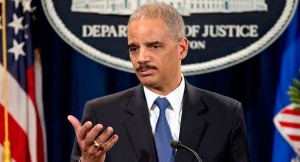Attorney General Eric Holder has been outspoken about his intention to fight to uphold the Voting Rights Act, despite the fact that the Supreme Court recently struck down its most efficient method of enforcement. Yesterday, Holder and the DOJ brought a second lawsuit against the state of Texas, staying true to his promise to "not allow the Supreme Court’s recent decision to be interpreted as open season for states to pursue measures that suppress voting rights."
Texas has a troubled history with discrimination in election reform, with several past voting laws coming under legal scrutiny, including a 2011 redistricting plan. That plan was rejected when Texas was still under the scrutiny of the Voting Rights Act's preclearance provision, and was immediately resuscitated once the Supreme Court freed Texas from preclearance. The DOJ filed suit against the state earlier this summer over their revival of the redistricting plan. The only way for Texas to once again be subjected to preclearance is for the Justice Department to prove that Texas engages in discriminatory voting practices.
This week, the DOJ piled on, bringing a second lawsuit against SB 14, a highly-controversial voter ID law. SB 14 was proposed as a way of preventing voter fraud (usually described as a widespread though almost totally undetected problem by those seeking stringent voter ID laws) or non-citizen voting (though, according the the DOJ's lawsuit, many forms of ID required by SB 14 are legally held by non-citizens). The DOJ believes that its true effect is to prevent those without means and transport from voting, in a state where the poor are disproportionately made up of minority populations without access to the funds or transportation required to visit the state's sparse driver license offices.
Will the Department of Justice make the case that Texas should come back under the preclearance screening requirements of the Voting Rights Act? The two cases now pending against the state could set a precedent that will persist as the best — and only — way to enforce the Voting Rights Act for some time to come.
